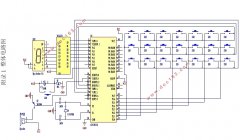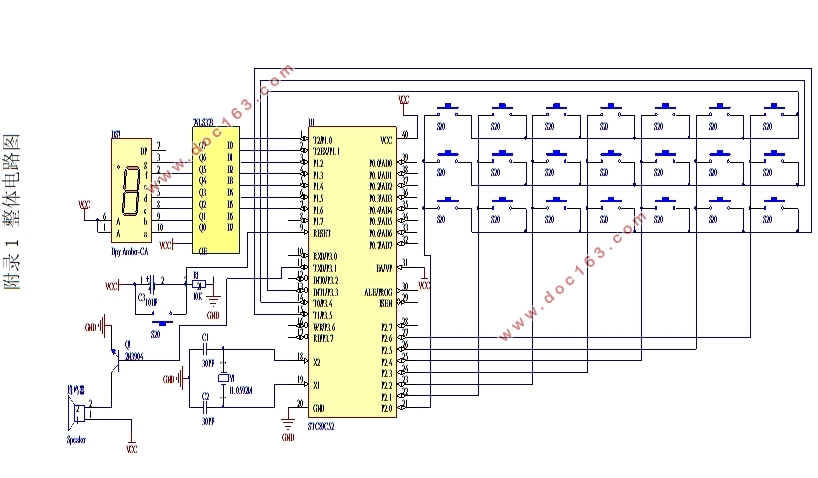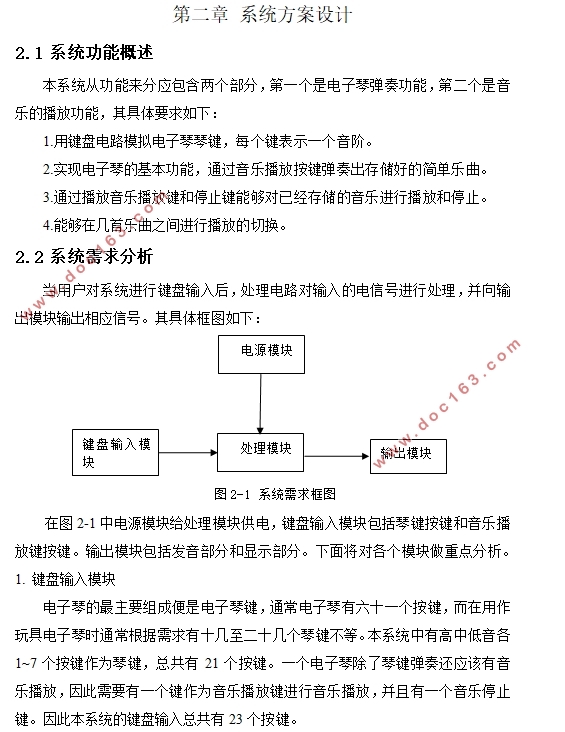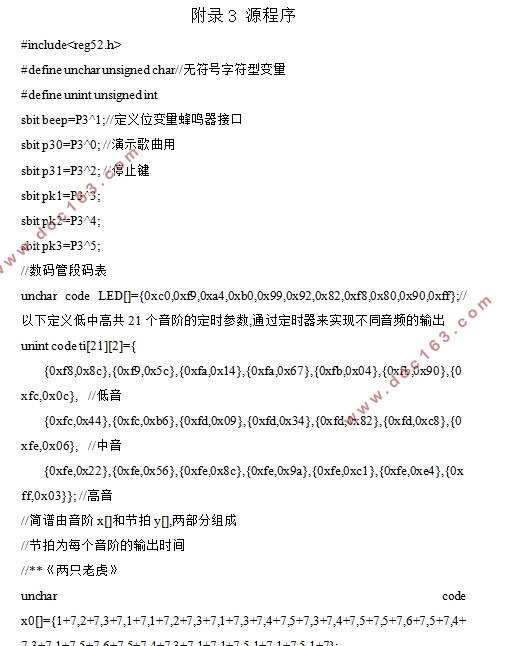基于单片机的电子琴的设计

1.无需注册登录,支付后按照提示操作即可获取该资料.
2.资料以网页介绍的为准,下载后不会有水印.资料仅供学习参考之用.
密 惠 保
基于单片机的电子琴的设计(论文11000字)
摘 要
本文设计了一个简易的电子琴。它以单片机STC89C52为核心,利用单片机灵活的编程设计和丰富的I/O端口,及其控制的准确性,实现电子琴弹奏和音乐播放两大功能,具体包括21个电子琴琴键弹奏,数码管显示,电子琴发音和音乐播放等功能。由于各个模块相对独立,具有低成本,便于升级和维护等特点。
文中第一章简单介绍了电子琴的市场背景的意义,第二章对系统的设计方案作了简单比较和最终确定,第三章重点阐述了本次设计的硬件电路的各个模块的方案选择,芯片选择,具体实现以及工作原理。第四章对系统的软件设计做了重点分析,包括语言选择,电子琴发音原理,系统流程以及其模块的流程。第五章介绍了本系统的软硬件调试和系统调试以及期间遇到的问题。最后结语做了总结和一些展望。
关键词:STC89C52;电子琴; 矩阵电路;数码管
Electronic organ based on micro-controller
Abstract
This paper designed a simple electronic organ. It uses STC89C52 micro-controller as the core and takes the advantages of the controller’s flexible programming design,rich I / O ports and the accuracy of it’s control to achieve two functions:organ playing and music player, specifically including 21 piano keys to play, digital tube display, organ pronunciation and music player. Because each module is relatively independent, the organ has the quality of low cost and it’s easy to upgrade and maintain.
The first chapter of this paper introduces the background of the significance of the organ market, the second chapter briefly compares the system design and confirmed in the end, the third chapter focuses on the program design, chip selection, implementation and works of each module in the hardware circuit of the design, . Chapter IV of the system software design makes a key analysis, including language selection, organ pronunciation principle, system processes, and its modular processes. Chapter V describes the hardware and software debugging of the system,system commissioning and some problems which is met during the design Finally conclusion makes a summary and some prospects.
Key words: STC89C52; Electronic organ; Matrix circuit; Digital tube
[资料来源:http://think58.com]



目 录
摘 要 I
Abstract II
第一章 引言 1
1.1背景意义 1
1.2电子琴概述 1
1.3课题的研究内容 2
第二章 系统方案设计 3
2.1 系统功能概述 3
2.2 系统需求分析 3 [资料来源:www.THINK58.com]
第三章 系统硬件设计 5
3.1 电路总体概述 5
3.2 主控处理电路 5
3.2.1 方案选择 5
3.2.2 芯片介绍 6
3.2.3具体电路实现 7
3.3键盘电路 8
3.3.1方案选择 8
3.3.2具体电路实现 9
3.4显示电路 10
3.4.1 方案选择 10
3.4.2 元件介绍 10
3.4.3具体电路实现 10
3.5发音电路 11
3.5.1方案选择 11
3.5.2元件介绍 11
3.5.3具体电路实现 11
第四章 系统软件设计 13
4.1 程序设计的语言选择 13
4.2电子琴发音原理 13
4.3 主程序流程 15
4.4 键盘扫描 16
4.5 蜂鸣器发音 18
第五章 系统调试 20
5.1硬件搭建 20
5.2软件编写与仿真 20
5.2.1程序调试与编译 20
5.2.2 软件仿真结果 21
5.3 系统调试 22
结 语 24
参考文献 25
附录1 整体电路图 26
附录2 实物图 27
附录3 源程序 28
致 谢 39
